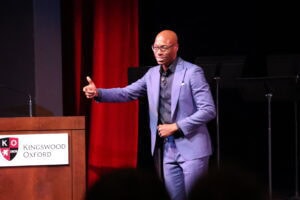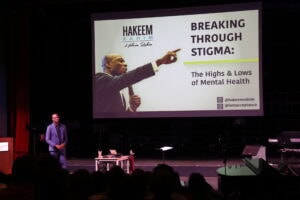May 05, 2025
Hakeem Rahim Inspires Hope at Mental Health Awareness Assembly
Marking the start of Mental Health Awareness Month, schools across the country are opening conversations that too often remain in the shadows. At one recent school assembly, students were treated to more than a talk — they were part of a transformative experience. Mental health advocate, educator, and public speaker Hakeem Rahim led a powerful, interactive session that fused personal storytelling, call-and-response engagement, and moments of collective reflection. His message: There is no shame. There is always hope. And we never, ever, ever give up.
He opened with a deeply personal reflection: the moment in college when he first experienced a debilitating anxiety attack. “My palms were sweaty, my stomach was flipping, and I had no idea what was happening,” he recounted. That moment would mark the beginning of a long journey — one that led to his eventual diagnosis with bipolar disorder while attending Harvard.
Instead of letting that diagnosis define him, Rahim used it as fuel to understand himself and help others. “Where I am is not the way,” he told the students — a reminder that what we feel in our most challenging moments doesn’t define who we are or where we’re going.
Rahim structured the assembly around celebrating mental health — not just managing or surviving it. “Oftentimes we don’t celebrate mental health,” he said. “We think it’s something heavy or shameful. But not today. Today, we celebrate.”
He invited students to participate in affirmations and shared a key three-part mantra:
It’s okay to talk about what you’re going through; There’s no shame; There’s absolutely hope.
Rahim, a spoken word artist himself, emphasized the importance of creative outlets in mental wellness. “Does anybody here write? Use art to express themselves?” he asked. Hands went up across the auditorium. He encouraged students to see their creative expression as a valid and vital form of healing.
He also challenged common myths about masculinity and emotion: “Men are supposed to be masculine and not have feelings — but is that true?” He affirmed that emotions are universal and that mental health must be talked about regardless of gender, race, or background.
Rahim didn’t sugarcoat the struggle. He shared openly that he had to take two years off from college. He talked about hearing voices, seeing things, and relying on the support of friends, family, and professionals. “Not every teacher knows about our mental health or can speak to it,” he said, “but they can be a trusted adult.”
In addition to storytelling and poetry, Rahim led students through tangible wellness tools, including: “Take Five” Grounding Exercise: Students traced their fingers with their breath, slowing their nervous systems and centering themselves. Affirmations and Acceptance Statements: Using the formula “I accept myself for… because I know… and I will…”, students practiced self-compassion. From listening to music and journaling to painting, nature walks, and speaking with trusted friends or therapists, Rahim emphasized the importance of building a personalized mental health toolkit. He reminded students that medication, if needed, is valid and nothing to be ashamed of: “Your meds do not define you.”

Rahim also spoke about his testimony before Congress and the Senate, where he advocated for increased funding and resources for mental health. “It’s not enough just to talk about it,” he said. “We need the resources.” While systemic change takes time, Rahim encouraged students to be part of the movement — to be open to one another and to always refer their peers to professional help when needed.
Rahim closed by reminding students that our conditions or challenges do not define us. “We are more than our labels,” he said. “We are not our diagnosis. We are human. And we are capable of healing.”
Hakim Rahim left behind more than a message — he left behind a movement of students empowered to speak up, seek help, and support one another. His presence turned Mental Health Awareness Month into a celebration of courage, creativity, and connection.
Because, as Rahim proved, there is hope; there is healing; nd there is always a way forward.
Resources provided:
National Alliance on Mental Illness
American Foundation for Suicide Prevention
The Trevor Project (LGBT focused)
